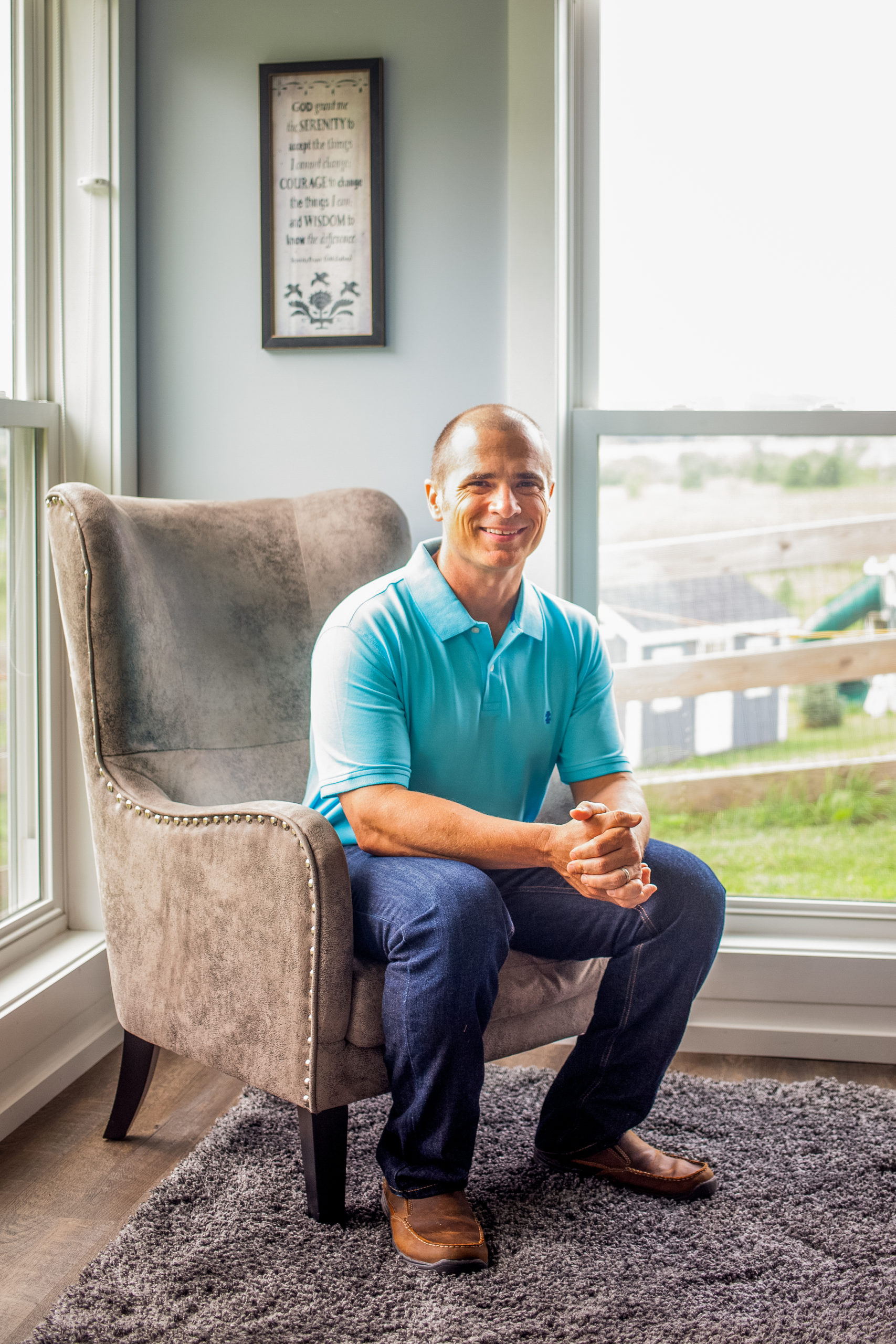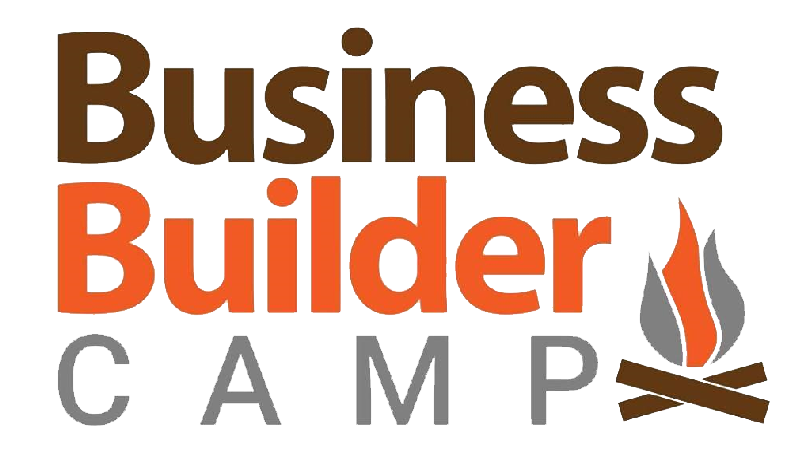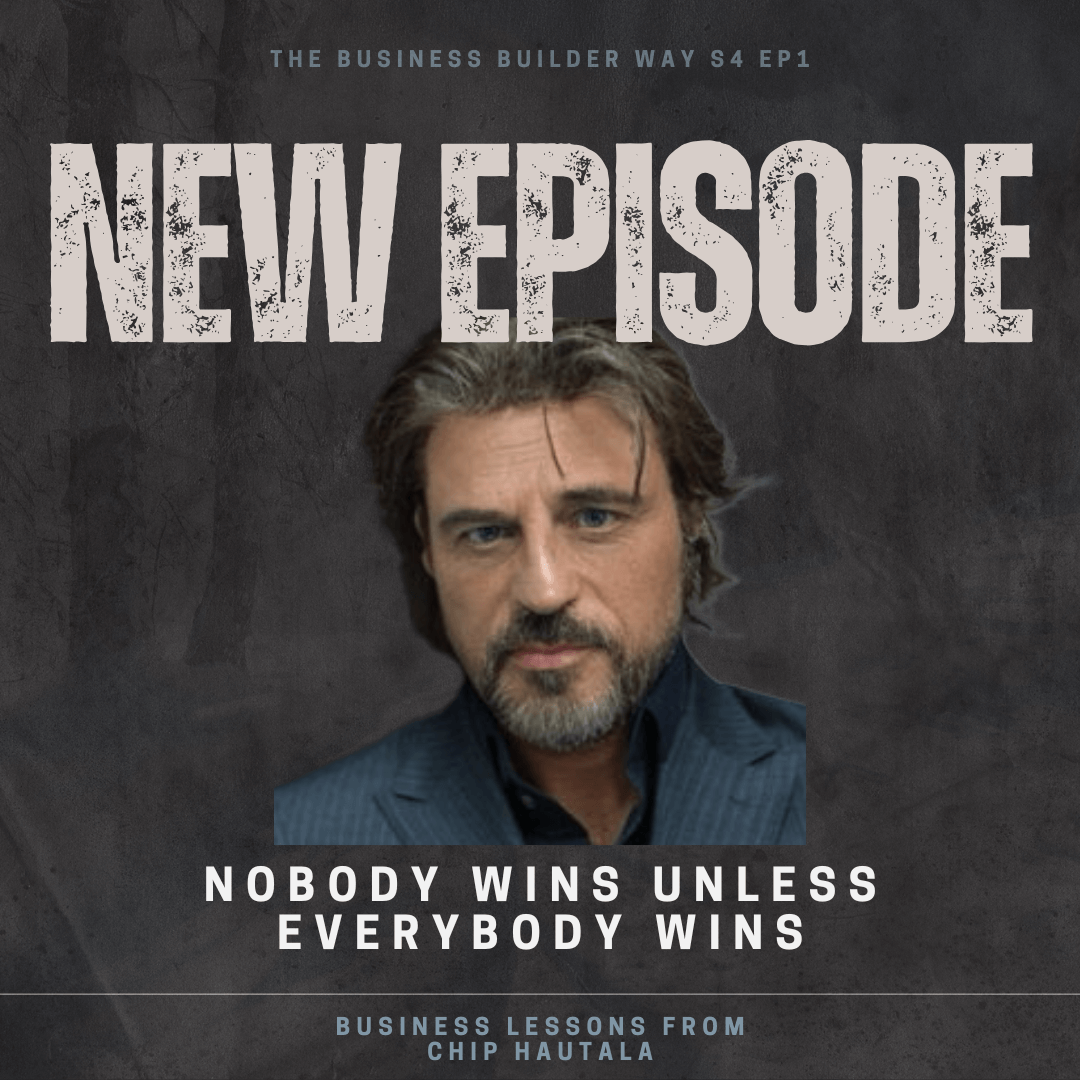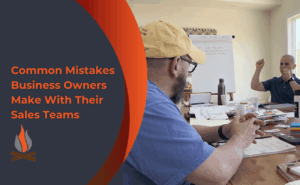Wayne Herring00:00:01 - 00:00:03
Hey. Welcome, Chip. Really good to have you today. I appreciate you joining us.
Chip Hautala00:00:04 - 00:00:06
Thank you for inviting me, Wayne. I appreciate it.
Wayne Herring00:00:07 - 00:00:27
Yeah. Hey. So I I have your, LinkedIn pulled up, and that's how we met was through LinkedIn. And it says what I'm looking at is it says inspired by the boss, our motto at MotionSource is simple yet powerful. Nobody wins unless everybody wins. Could you tell us a little bit more about that?
Chip Hautala00:00:27 - 00:01:02
Yeah. That's, if you're familiar with Bruce Springsteen, the boss, that's one of his expressions, and I always believed in that. We have that hanging in our front office reigned. And what it basically means is we work as a team here. We value group victories. We look at every victory as a group victory, and I'm a team victory. I'm an old ball player, so I know that one person does not carry a team. And it means that our suppliers win, our customers win, and our employees win, and our team members.
Chip Hautala00:01:02 - 00:01:16
So in order for us all to be successful, we all have to be successful. We have to please everybody. Everybody has to win in this whole thing. So that's our premise of business and how we operate.
Wayne Herring00:01:17 - 00:01:24
Got it. So it's kinda simple and memorable, and everybody can look to the boss for inspiration.
Chip Hautala00:01:25 - 00:01:26
Exactly. Exactly.
Wayne Herring00:01:27 - 00:02:15
You know, we talk here on the Business Builder Way about building businesses, building something that is more than just you, and it flows and it works almost as a kind of a separate creation. It is. It's a creation. I think business builders are artists or creatives, and we you get ideas, and maybe it's not all a big idea that you put on a drawing board initially. You probably could have envisioned what it's turned into, but nonetheless, here's this machine going on. And as you said, customers and employees are all being served by this thing that was created by you and those other people. So can you just talk a little bit about the practicality of motion source? What is the business you're in? What do you do? Who do you serve? And then Okay. I'll ask about employees too.
Wayne Herring00:02:15 - 00:02:18
But what is the business? Who do you serve, and how do you do it?
Chip Hautala00:02:18 - 00:03:20
That's a great question. We're in industrial lubrication and hydraulics. We engineer systems for anything from the auto industry, energy, rubber industry, food and beverage, packaging, steel industry. And we serve all those industries because, basically, every single industry that's out there, especially in the Midwest here, but every single industry uses lubrication on their machines and uses hydraulics. And when people say, what is lubrication? What do you mean by lubrication? What I always say is if you ever remember any of the old Charlie Chaplin movies where he walked around with an oil can and Yes. Oiling the machines. Okay? We put him out of work because what we do is we engineer systems that lubricate the machines as they're working. So there's no need to shut down the 3rd shift to have the machines maintained.
Chip Hautala00:03:21 - 00:03:25
They're actually being maintained as they're being used, and that's that's what we do.
Wayne Herring00:03:26 - 00:03:51
That's a great illustration. We're not on video today. I'll have to I don't know what the copyright protection is on a Charlie Chaplin movie, but I can understand that. There's a great I don't know which one it is, but there's one where he's working on an assembly line, and it keeps going faster and faster. And they're, like, falling off, and he's his job is to turn bolts and stuff. Mhmm. So that's good. Who is on the team? What is motion source in terms of a collection of people?
Chip Hautala00:03:52 - 00:05:12
You know, we've got a wide direct collection of people. We have people who have been grizzled veterans in the industry and people who are new to the industry, and we try to maintain a balance of it. One thing I'm particularly proud of that happened by accident wasn't by design, but this is a very male dominated industry. I mean, I would say 97, 98% of people in this industry are males. And we have a female national sales manager, a female customer service manager, and we have female sales reps in addition to male. But it's and we have a grouping of every age group. And what's been great is the people that have been veterans of this, rather than keeping a silo of knowledge and not sharing it, have said, hey. If I retire with all this knowledge and don't share it, what good does that do? And so they've they hold weekly classes with the younger people coming in and work with them and teach them what they've learned over the years because it's everybody uses what we sell, but it's a small industry.
Chip Hautala00:05:12 - 00:05:24
And just today, even we have an intern starting today, and he's gonna get get schooled on everything before he's allowed to do anything. So he'll get some information and be a lot smarter when he leaves here. So
Wayne Herring00:05:25 - 00:06:00
Well, you said that having the female dominated team wasn't necessarily intentional, but that happened. But I I would imagine that that means to me, it's just you're open minded to whoever's the most talented is who you're gonna hire, and it sounds like that open mindedness has and and not holding any sort of biases, or holding tight to knowledge has bled through your culture when you have people willing to share what they've got with younger people as well.
Chip Hautala00:06:01 - 00:06:44
Definitely. The culture here, we don't hire for you can know everything that there is to know in this industry and be a bad fit for us. Because if you can't cooperate and you can't work in a team environment, it's not gonna help you. I mean, I've worked in places, and I've done sales in places where it was so competitive. It was a cutthroat, industry even just within the company. And that's not a way for a company to succeed, and I never wanted to have a business that was like that. You know, everybody fears everybody else, and everybody feels as though their job is always on the line. One of the things I always tell people when they're hired is, I will never quit on you as long as you don't quit on yourself.
Chip Hautala00:06:44 - 00:06:52
As long as you keep trying, I promise you I won't fire you. I won't let you go no matter how bad you're doing. Because if you're trying, you'll succeed.
Wayne Herring00:06:53 - 00:07:29
So I remember, you know, again, we we connected on LinkedIn, and Mhmm. I listened. And I'm looking at your post as we're talking, and now I remember you wrote about your grandmother and the song everyday people, and I listened to it. I read your post. I probably commented on it, and I listened to that, and I played it. I listened with my son because here's what I wrote. I'm gonna listen to the song as I drive my 15 year old son over to the farm for work this morning, and I did. So that was planted in you at a young age, was this kinda open mindedness and everybody cooperating.
Chip Hautala00:07:30 - 00:08:05
It was. I mean, we're, you know, we're all the same. And I've had some good bosses along the way and some bad bosses along the way that have shaped it too. One of the ones that sticks out to me is I had a gentleman I worked for that used to say nothing that happens within these 4 walls is ever as important as what happens outside these 4 walls. It's important to build relationships. And another one that made an impression on me when I was in my twenties, I met him. I happened to bump into him and his wife shopping one time, and he introduced me as, you know, this is Chip. We work together.
Chip Hautala00:08:05 - 00:08:28
Instead of Chip works for me, we work together. And I've always taken that as a lesson, and I never introduce anybody as, yeah, they work for me. It's we do work together because I tell the people here too, you don't work for me. Really, I work for you. Whatever I can do to make your job easier, that's what I'm here for. So that's what we do here.
Wayne Herring00:08:29 - 00:08:49
Nice. So you have, salespeople clearly that are going out visiting these manufacturers and working to get your solutions in there. So how many people are on your team? You you have salespeople. You mentioned director of sales. You mentioned customer service. Like, what's the flow? What are the roles in the company?
Chip Hautala00:08:49 - 00:09:16
We do both. We have a sales team. We do a lot of it. COVID taught us that we don't need to make in person sales calls as much as we used to in the past. Sometimes we still do, and it depends on what area we have salespeople spread across the US. So it depends. A lot of what we do is via email, phone, Zoom as we're doing. Some of it is in person.
Chip Hautala00:09:16 - 00:10:10
Some customers like you to stop in, and salespeople are tasked with growing the business. Customer service is tasked with helping supporting the sales team and supporting the customers. And then we have a warehouse and a service department, which we have have the ability to do installs, repairs, and things of that sort. So everybody has a defined role, but everybody is cross trained as well. So if, somebody can't step in, then If somebody's not here, somebody else can step in for them. And what we learned during COVID so this is kind of interesting. But when I started the company 12 years ago, I have, like, an IT background. So I thought, you know what? I'm gonna put everything in the cloud because we live outside of Cleveland, and there's gonna be a couple days out of the year where I'm not gonna wanna drive it in the snow.
Chip Hautala00:10:10 - 00:10:38
So nobody has to drive it. We could all work from home. Well, little did we know that there'd be a pandemic where we would work from home for 15 months, but we never missed a beat with it. I mean, everybody was able to work from home. The guys in the back, I told them, if you wanna come in, you can't work from home because, you know, physically, you can't do it. But if you wanna come in, I'll pay you time and a half. If you don't wanna come in, then don't worry about it. You know, you still have a job afterwards, but they all said, no.
Chip Hautala00:10:38 - 00:10:44
No. We'll come in. Maybe that's fine. We'll wear masks and stuff like that. So it it worked out well.
Wayne Herring00:10:45 - 00:10:46
Gotcha. About how many people in the team?
Chip Hautala00:10:47 - 00:10:49
Under just a little under 20.
Wayne Herring00:10:49 - 00:11:12
Nice. So, yeah, good segue. You mentioned that you're in IT, and so as you started this thing, you're like, okay. I'm gonna put everything in the cloud and then, yeah, positioned you really well for what ended up happening that weird time that we all went through. So when did the thought occur to you, like, that you're gonna start your own company? And did did the thought look like what it's turned into, or is it different?
Chip Hautala00:11:12 - 00:11:58
Well, I had owned an IT consulting business many moons ago, and so this is not my first business. And then my wife and I owned a business that was we built spec houses because if I wasn't doing this, I would love to be a carpenter. So we did that. Now with MotionSource, it came about in kind of an odd way and that I was almost forced into it. I had lost my job at the previous company and needed to do something. And I had been basically running that company for a few years, and I didn't wanna go back to working for someone else. And my wife encouraged me to start my own company, and so I did that. And it's grown since then.
Chip Hautala00:11:58 - 00:12:25
It started off you just have to maintain a good a good reputation in the industry, and I think I'm trying to do that and had a lot of suppliers that were willing to work with us. And it all came about that way, and we just started I mean, started slow. And the more people we hired made quality hires and things of that sort, and it's worked out pretty well, I would say.
Wayne Herring00:12:25 - 00:12:34
And so did you hire somebody off the bat, or did you start going out selling these products by yourself? Or how did you get started?
Chip Hautala00:12:35 - 00:13:31
I'm not a good salesperson in the least bit. So, no, I had, started it with another gentleman from the previous company, and there were a couple people that I had hired there that wanted to work with us and keep over to Motion Source. And one of the sales people there that was great at him, he's one of the gentlemen that I talked about that shares knowledge now with him. He wants to share his knowledge, and we brought more people along the way. We were small, very small at first, and we started to get, a little bit larger than started to branch out into other areas. 2016, they brought in a gentleman as an investor, allowed us to look into opening offices and other cities as well, at least just sales offices and that. So that helped us out as well.
Wayne Herring00:13:32 - 00:13:36
And what's been the hardest thing about building a business?
Chip Hautala00:13:37 - 00:14:06
Well, I mean, the 1st year, I went without paying myself. That was pretty difficult. Don't go into business and expect yourself to be a millionaire. The most difficult part, I would say, I don't know because I enjoy it. I really do. I enjoy working with the people. I enjoy the people I work with, and I enjoy making a difference in people's lives. I mean, we just last year, we had one of our people buy their first house, and then a couple weeks ago, somebody else bought their first house.
Chip Hautala00:14:06 - 00:14:36
That outweighs the feeling that I get from knowing that we're a very, very small part of that. That outweighs any of the difficult times. So at the difficult times, I would say you know, I can't say anything that's really difficult. I enjoy it. I mean, what's the difficult thing might be some of the people at times that don't appreciate, but wanna work on a team and that we discover it 6 months into the process. And it's, you know, wanna be a lone wolf, and it doesn't really work out well.
Wayne Herring00:14:36 - 00:14:49
So you got 20 ish people. You have salespeople that are in other states and other locations. What's your plan for the future? What do you think about when you think about 3 years down the road?
Chip Hautala00:14:50 - 00:15:43
Just to not necessarily get larger as far as people goes. I mean, that could happen. But to get more efficient in what we do, to be able to be a better supplier to our customers, to have the answers for our customers, to be better trained, right now, I say that we're lucky in that training is a big part of what we do here, so people do come to us for technical advice. But I'd like to see that improve even more where we're the technical experts that you can come to, and you're gonna get the right answers. So I I would say improving internally is the goal. And in doing that, we will improve our service to our customers and to our suppliers. And It'll be one of those situations that nobody wins unless everybody wins. We'll all win that way.
Wayne Herring00:15:44 - 00:15:56
You're the CEO, and you work with these other people. They don't work for you. But do you do you have a leaders do you have a leadership team? Has a leadership team formed around you to guide that direction of the company?
Chip Hautala00:15:57 - 00:16:28
Yeah. We do. Our head of customer service, and I would say that's Lee, and I would say Heather, our national sales manager, are 2 of the leaders in the company, and I can count on what I always say. I don't need you to tell me I'm right. I need you to tell me when I'm wrong. I mean, Steven Jobs said, we don't hire smart people and then tell them what to do. We hire smart people to have them tell us what to do. And that's the way I look at it.
Chip Hautala00:16:28 - 00:16:55
I don't want somebody who's a yes, ma'am. So I always when we roll something out new, I consult with them. And like I said, the gentleman who's investor in the company is a great resource as well, and he has vast experience in the industry. And I can ask him anything, bounce anything off of him 247 and get answers like that. So I'm I'm backed up with a great team of people.
Wayne Herring00:16:56 - 00:17:13
That's great. So I I think about the the business builder, the CEO, the founder. How do you incorporate this business in your life? Or does life stop and then the business begins or business serves your life? Or, like, who are you outside of work, Chip?
Chip Hautala00:17:14 - 00:17:45
I am outside of work. I've been married to my you'd say high school, sweetheart, but my grammar school, sweetheart. Uh-huh. But I've known each other since we've been 4 years old. My wife and I have known each other since we've been 4 years old. I actually told her in 2nd grade I was gonna marry her when I grew up. And so my wife and I do not have children, but we have 4 dogs. We work with animal rescue, support veterans groups.
Chip Hautala00:17:45 - 00:18:09
I come from a family of veterans. I've never had the privilege to serve, but everyone in my family has served going back to the Civil War. And that's basically who I am. I'm a huge Cleveland Browns fan, which you Mhmm. Absolutely Pennsylvania will probably laugh at me. But I live and die with Cleveland Browns. That's one of the reasons, if you've noticed, the motion source colors has orange in there. Mhmm.
Chip Hautala00:18:09 - 00:18:27
And that's a nod to the Browns. And like I said, I own ball player. I'm a big New York Yankees fan too, which people in Cleveland do not like me for that. But that's it. I mean, I love living in the country, love animals, love my wife, family, and that's kinda who I am. So
Wayne Herring00:18:28 - 00:19:35
So I have this picture of you now, and it's a a company that you know, so lubrication, the oil can, go back to Charlie Chaplin. It's kind of a behind the scenes. Maybe it's not underappreciated, but it's not at the forefront. It's not Elon Musk and Tesla's, but yet your equipment probably helps create a lot of things that are in the spotlight, so to speak. But the work that you do, the oil can, the lubrication on the assembly line in the Midwest, it's like, blue collar, wash, rinse, repeat, making the wheels of society turn around, and then you are a guy who's pretty humble, and you you started this thing, and, oh, now we we've got 20 people. And I thought ahead and didn't know what was coming down the pike, but it seemed like a good idea to put things in the cloud. Because I've been to Cleveland when I used to be on the road, and I remember they would hand I I felt like they would hand you an ice scraper when you landed in
Chip Hautala00:19:35 - 00:19:41
in England. Yeah. That's true. They as you when you're born in Cleveland, they give you an ice scraper. Sure. Right.
Wayne Herring00:19:41 - 00:20:17
Instead of a rattle, like, just so you so you thought ahead, and then it ended up working out. And here you are, like, hey. I love my wife, and I love people who got houses. They were able to buy their first house, and we worked together. And it's it's pretty cool. Like, people that would come to work there would think this is a place of stability and honoring my work efforts is what I hear in that. It's like Midwestern, nice, hard work, things
Chip Hautala00:20:17 - 00:20:17
that could
Wayne Herring00:20:17 - 00:20:18
flow through.
Chip Hautala00:20:18 - 00:20:54
I would like to think so. I'm not a religious person, but I'm a person of faith. And I believe that I am my brother's keeper, and I've been given an awful lot in life. And the more you're given, the more is expected of you. That's you know, it gives me a thrill when we have an employee that buys a house or gets a new car or so I always tell the salespeople, I love writing out big commission checks. That pumps me up more than you can imagine because that means that not only are you doing your job, but I'm doing my job too. So it's a great thing.
Wayne Herring00:20:55 - 00:21:29
You mentioned that since COVID, your sales team realized don't need to necessarily be out in the field calling on all these people face to face. And I don't know how much you even get involved in sales because you mentioned you have this strong sales leader. But what what are some of some of the ways that how do you find new industrial customers in 2024 when you're not when when it's not something that people really do anymore to go around and drop in? You have to be using electronic tools. Right?
Chip Hautala00:21:30 - 00:22:15
We have a huge web presence. We have a web store, and we get a lot of new customers that way. We don't do ad buys so much as we do search engine optimization, and we get a lot of customers that way and pass those leads onto our salespeople. And I pop in and call every now and then as well. Not that I'm like I said, I am not a good salesperson, but I think it means something when the owner of the company calls a customer and tells them thank you. So try to do that too. But that's kind of how we leverage things, and we do relationship selling. I can't tell you how many times the customer has called us for advice, and we solve their problem for them and not made a sale.
Chip Hautala00:22:15 - 00:22:39
I mean, it's like, no. You don't need a new motor. What you need is this, you know, and and you just need to change this out and blah blah blah. But I think people are appreciative of that, and they come back to us then when they do need something and say, you know what? You helped me out, and I didn't even bought anything from you. But now I do need something, so you're gonna wanna be the one I come to first. And we don't do it for that reason. It's just we're here to help each other out.
Wayne Herring00:22:40 - 00:22:55
Well, that certainly works out if you get a lot of your leads from SEO and you're legitimately answering questions and trying to help people, and you're working to be a trusted adviser even if they're not a client. Right?
Chip Hautala00:22:55 - 00:23:17
Right. Definitely. Definitely. We work with and I won't say the name of it. They're known nationwide that they use us as their technical end of things. They have zero technical expertise whatsoever, and we'll blind ship things for them. We'll build things for them, engineer things for them. And, you know, they come to trust us because we've never gone back to any of their customers or anything.
Chip Hautala00:23:17 - 00:23:22
And that's how you build your reputation in this industry is helping people and being trustworthy.
Wayne Herring00:23:23 - 00:23:47
So last question. You 2012, you started. We're 12 years into this thing. You've got around 20 people. Culture's pretty evolved. People are sharing knowledge. Here you are, CEO. You mentioned that you call some of your customers on the phone at times, and they appreciate being they appreciate being appreciated by the the CEO of the company.
Wayne Herring00:23:48 - 00:24:46
I get the question from business owners when they get to a point where they aren't necessarily having to be on the front lines, you know, grinding it out every day, doing whatever it was that their skill was. Some of them could be bricklayers, or they could be, you know, beauty shop owners or whatever the case may be. And in the beginning, they're really involved with either actually laying the bricks or hiring the people who lay the bricks or supervising the jobs eventually, but at but at some point, they get to a point where they're more of a true CEO, and they have people that are very competent who, like you said, Steve Jobs said, you know, we're gonna gather smart people up, so let's really use their talents. You're it sounds like you're at that phase. You got the strong team. What do you fill your days and your weeks with that helps to contribute to to your coworkers ultimately? What do you what do you do, Chip?
Chip Hautala00:24:46 - 00:25:38
Well, I laugh when you said, typical CEO or, you know, the prototypical c CEO because I don't think I'm the prototypical CEO. I mean, I have long hair, earrings, tattoos, things like that. So I fill my day with being a coach. I I see my role as a coach and to guide everybody and to really the job of a leader is to create more leaders, not to create more followers. So I try my best to create leaders here in the company. And without getting too much into it, if you spend a week here, you would be able to see, okay. I see now what the progression of this company is gonna be. And I can see people who are gonna take over this company when Chip decides to spend his day golfing all day.
Chip Hautala00:25:38 - 00:25:44
You know? That's so, yeah, I think that's a good thing. And so I see myself as a coach. That's my role.
Wayne Herring00:25:44 - 00:25:53
Alright. Now I have to ask one more question. How did you get to that place where do you see yourself as a coach, and how have you refined those skills and focused on that?
Chip Hautala00:25:54 - 00:26:26
That's a good question. I think that you you you're always going through life learning, but you're also go always going through life teaching as well. And coaching is a form of teaching, and I've coached I I love coaching. I have coached baseball teams in the community for years too. And even though I don't have any children on the team, so I just I just love it. And I think it's part of sharing your knowledge. I don't know how it evolved. I think it just started happening.
Chip Hautala00:26:26 - 00:27:03
I think I've always been that way kind of, and it just seems like the right thing to do. I don't know any other way to do it. So, I mean, even when I had a a more active role, say, doing sales or something that. When I first got out of college, I did sales, and I had people that were coaching me and helping me out. And I think too, and this might sound silly, but I think you can learn a lot from bad bosses too. I thought, if I ever start a company, I'm not gonna be that way. I'm gonna be the exact opposite of it. And, you know, and why would I be the exact opposite of it? Because I know how they made me feel.
Chip Hautala00:27:03 - 00:27:12
But bosses like that, I learned a lot from. And I learned is there's a don't say, and you learn a lot more in defeat than you do in victory. And that's true.
Wayne Herring00:27:12 - 00:27:43
Well, Chip, I appreciate that that makes sense that you've coached baseball teams in the community and just love lifting people up. And I appreciate you sharing a bit of your story with the rest of us. And I know there's things in this that we'll all be able to to take and take a look in the mirror and see how we can implement them. So I appreciate you. Thank you for showing up today and sharing your wisdom and your experience and the story you're building your company with all of us.
Chip Hautala00:27:43 - 00:27:49
Thank you, Wayne, and thank you for the opportunity. I appreciate it. And, I really enjoyed our conversation.





